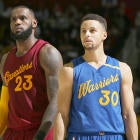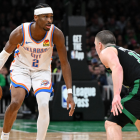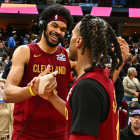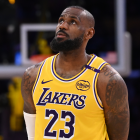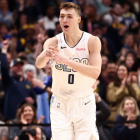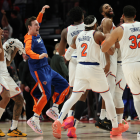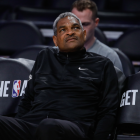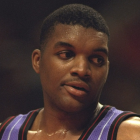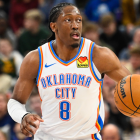We're halfway through the season, and the two teams that matter most in the NBA -- the Cleveland Cavaliers and Golden State Warriors -- have had roller-coaster seasons. A month ago, the Warriors had lost to the Grizzlies, Rockets, Spurs and most notably the Cavaliers. Despite adding Kevin Durant, they looked mortal, and especially shaky in the clutch. The Cavaliers, meanwhile, looked like they had the best team they've ever put on the floor. They were dominant, dynamic and looked like they had built chemistry and continuity.
A month later, things look very different. Smudges on the Cavaliers' veneer look like huge cracks, and Golden State has taken every weakness and corrected them. Now it's the Cavaliers looking up at that mountain that is the Warriors and wondering how they're possibly going to have enough to get past them in June.
Since these two teams are constantly measured against one another, let's look at where these two grade out in certain areas to get a sense for where we are. We'll start with the offense, then switch gears to defense.
(Note: All stats are as of Jan. 27)
 Ball movement: A+
Ball movement: A+
This is a no-brainer. With Golden State, the ball moves like electricity, bouncing from one connector to another along invisible wires. Part of what makes the Warriors special is how their system is built on setting up a player in an elbow or extended post spot, and then giving the opponent no good options. The Warriors post up a lot ... they just never score from there. They do this:
The other part is how dangerous all their players are. Stephen Curry demands so much attention that someone's almost always open. The difference is that in most situations, when someone's open, they just shoot. Here, they keep pursuing an even better shot:
And the final part is their chemistry. They have a keen understanding of where each other will be, and they're always pushing for the big play. This is a jumpball, for crying out loud. They should just secure the rebound and run offense. But Curry streaks up the floor, Draymond Green has the vision to see it, Durant doesn't just sit back and watch Curry's run out, he follows up and Curry has the audacity to make this pass:
That sequence is bonkers. It's brash, arrogant, fun and brilliant. It is everything the Warriors do wrapped up in one sequence.
 Ball movement: B-
Ball movement: B-
When the Cavaliers move the ball, they have a synergy that was missing before this season:
They have the ability to just move the ball around with LeBron's basket-to-corner wraparounds and other insane passes, and they trust each other more than ever. The only reason they're not graded higher is because they don't really need to be. The Cavs are ranked 18th in assists, compared to the Warriors' No. 1. They are, however, 10th in assist points created. And they only use isolation plays 11.7 percent of the time, via Synergy Sports. They get most of their points out of pick-and-roll and transition opportunities; they have such great individual scorers that they don't need to be constantly whipping the ball around. They have three superstars and a thin bench, so their offensive profile will be different from Golden State's.
 Shooting: A+
Shooting: A+
I mean, come on:
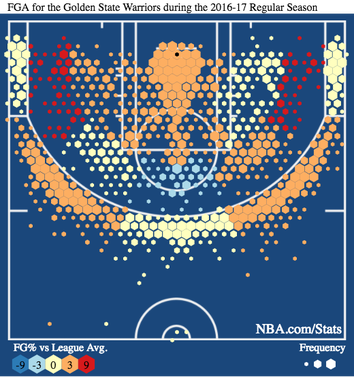
Did you know that the Warriors actually aren't No. 1 in 3-point shooting? The Spurs lead in percentage. When it comes to made 3-pointers per game, the Warriors are tied with the Celtics for third behind Houston and Cleveland. The Warriors are much more of a basket-attacking team this season, in part because teams are overplaying their 3-point attempts and in part because they added so much athleticism in Durant.
 Shooting: A+
Shooting: A+
These two teams are going to break their own records for 3-pointers made in a playoff series. The Cavs are tied for fourth in effective field-goal percentage at 53 percent:

The Cavs, as mentioned above, are No. 2 in made 3-pointers per game and are lights out at the rim as well. They work to create good looks. They hold these marks despite J.R. Smith having been out for over a month and still working Kyle Korver into the rotation. In particular, Iman Shumpert has been fantastic while Smith has been out and that has helped a lot.
 Screening: A+
Screening: A+
The Warriors lost Andrew Bogut, but their strength in screening remains nearly unmatched. It's not just their technique, they hit you from all sorts of angles. They use Curry as a screener, disrupting your focus off the ball. They can level you with Green or Zaza Pachulia, or just disrupt you with tough angles with 7-foot Durant or Shaun Livingston. Everyone helps everyone get open.
The Warriors are the No. 1 team in "screen assists" in the NBA at 13.4.
 Screening: B
Screening: B
Slipping screens is a bad habit for most teams. The bigs wanting an opportunity to score are always looking for that quick sneak to the basket, even when their guard is in desperate need of an actual ounce of space. So it should be noted how deadly the Cavs are at slipping. James, Kevin Love and even Kyrie Irving can move so quickly out of the screen and it opens things up.
Meanwhile, Tristan Thompson is just a beast at screening.
That said, the Cavaliers are a bottom-15 team in screen assists per game. Again, if they needed to, they could use them more, but they don't.
 Transition offense: A+
Transition offense: A+
They are the No. 1 team in points per possession in transition. They thrive in chaos. You saw that clip above. They are a monstrous machine of malleable malevolence. Everything that makes the Warriors great is shown when they get out and run.
If you do not get back, you are dead before the ball even crosses halfcourt.
 Transition offense: A+
Transition offense: A+
It might surprise you to find that the Cavaliers are No. 2 in points per possession in transition. They're equally awesome. Love and James have found real connection this season and that has helped unlock a lot, but they also just know where the others are going to be. Tyronn Lue deserves a lot of credit for unlocking the athletic potential for this team that was untapped under David Blatt.
That said, it does feel notable that the Cavaliers have continuously become more and more Warriors-like. Look at their evolution. They got better in transition and 3-point shooting. They are definitely trying to beat the Warriors at their own game. Will they be able to grind it down in the Finals, which has helped them so much in the past two matchups? Something to watch for.
 Offensive rebounding: D
Offensive rebounding: D
It doesn't really matter, because, you know, they make all the shots, but they're not good in this area. It's just not a focus for them. They focus on getting back in transition. The Warriors are 19th in offensive rebound percentage, which is the percentage of their own misses they snag.
However, it should be noted that when they do get an offensive rebound, it's absolute doom. Because the defense is naturally scrambled after a missed shot expecting a rebound, the Warriors find opportunities everywhere. There's nothing more demoralizing for an opponent than working to actually force a miss, only to have Green wind up with it. When your best rebounder is also your best passer, it wreaks havoc when you do get the ball back.
However, Green himself is only in the 11th percentile on put-back attempts. When the Warriors try and just tip the ball in, they're not great.
 Offensive rebounding: C
Offensive rebounding: C
Cleveland is 14th in offensive rebound percentage and 27th in put-back points per possession. They're just not as good there as you might think. Think about how the Cavs have evolved their roster over the years. Timofey Mozgov went from major contributor to barely playing to off the team. They added Channing Frye, a pure stretch-big, and kept adding more and more shooters. They're not that team anymore. This isn't so much a problem, since their offense is so efficient, but it is notable that they are not this big, bruising team anymore.
 Overall defense: A-
Overall defense: A-
So switching gears to the defensive side of the grades, here's where you need context. If you want the simple, data-driven, objective, empirical analysis, the Warriors are the best defense in the NBA. They are No. 1 in defensive efficiency, better than the Jazz or Spurs or Grizzlies. They smother you completely.
The only thing that gives pause here is that they have shown a capacity for teams to be able to goad them into shootouts. Now, they win those too, because, well, read the offensive section. But the Warriors are basically two teams wrapped into one. Some nights they are the defense-first monster they were in 2015 that got stops, ran, scored and repeated that formula all over. Some nights they are the explosive team they were last season that would let you score, but then would just go on brain-melting runs of offensive bursts, with 3-pointer after 3-pointer after 3-pointer. They are a better team when they are that 2015 team, even though last season's squad won 73 games. Much of that was just "Steph Curry is liquid fire." Curry is just normal fire this season, and they're better when they are a defense-first team.
That said ... they're awesome. They are top five in Synergy Sports evaluations of points per possession defending spotups (No. 1), transition (No. 1), cuts, (No. 3) and postups (No. 5).
That spotup number is huge, because that accounts for 20 percent of all shots against them. They bring constant help in the pick and roll. For a lot of teams, that means giving up buckets on kick-outs. But watch Durant on this play. He's going to sag down to tag Roy Hibbert on the roll here so the Warriors can hedge on the ball-handler, but he anticipates the kick-out and contests it. It doesn't hurt that he's 7-feet tall with ladder arms, but the anticipation helps.
Same deal here with Green. Not only does he anticipate Montrezl Harrell making the pass to the corner, which helps him recover, but watch how hard Green, an All-Star, closes out.
These are the little things the Warriors do that make them better. Their scheme is good, their effort is great, their results are tremendous.
 Overall defense: C-
Overall defense: C-
This team has fallen apart defensively this season. They were sixth in defensive efficiency in the first 10 games, then were 22nd over the next 10, then improved to sixth in games 20-30. Since then, they are 23rd. They just haven't been good on that end.
Most notably, Cleveland is 30th in transition defense. If you're thinking "Boy that doesn't sound like it'll work out well against the Warriors," you are correct. That's a problem. Some of that is effort; the Cavs have coasted and are in a malaise. Some of that is the roster. When you have Richard Jefferson and Frye playing major minutes, you're not going to be able to get back all the time. But the end result is alarming.
They're also 30th in guarding the pick-and-roll ball-handler. This is a good example of their problems. Irving takes a bad angle, and Frye is not going to be able to recover over. He's not a rim protector. This is an issue.
They still get a passing grade for three reasons. One, it's pretty clear they're coasting. Two, they've been without J.R. Smith who, I can't believe I'm saying this, plays a huge role in their perimeter containment. And third, they're really good at defending straight-up stuff -- they are fifth in defending spotup shots, second in isolation defense and second in guarding cuts. They can guard their guy, it's interfering with complex actions they're struggling with, and that's fixable.
 Rim protection: B
Rim protection: B
Golden State's big weakness isn't much of one at all. The Warriors are fourth in defensive field-goal percentage at the rim. Much of this, as SB Nation pointed out, is because Durant has basically become their rim protector, recovering from the perimeter to contest inside.
The only reason they're not higher on this is because they are only ranked 15th in defending the rim on non-postups, via Synergy Sports. And they give up the fourth-most attempts at the rim. They only allow the 14th-most made shots at the rim, but that's still a pretty high amount. Basically, they are still giving up points at the rim, just not in postup situations.
They've done a good job but the rim protection numbers aren't quite as good as they seem on the surface. If you're going to attack the Warriors, this is still where you can do damage.
 Rim protection: A-
Rim protection: A-
The Cavs are ranked fifth, right behind Golden State, in at-rim field-goal percentage, but they also give up fewer attempts and makes. They are top 10 in defending non-postups at the rim and defending put-back attempts. They still contain you, and Thompson and James remain very stout in guarding the rim.
Of note, Love is in the 61st percentile in defending postups this season He has done his job on that end.
 Defensive rebounding: D
Defensive rebounding: D
Again, no big surprise here. When you're looking at defensive rebounding, there are two stats I pay more attention to: opponent offensive rebound percentage (which is just 100 minus the defensive rebound percentage, but still) and second-chance points. Who cares if you give up a bunch of offensive rebounds, if they don't score anyway?
The Warriors are 18th in opponent offensive rebound percentage (meaning they give up the 13th most). That's actually not as bad as you might expect for a team that plays so much small-ball. Here's the problem.
They give up the sixth-most second-chance points per 100 possessions. That means that even accounting for their fast pace of play, Golden State gets shredded on those situations. Why does this matter? Imagine when it's LaMarcus Aldridge and Kawhi Leonard. Or JaMychal Green and Zach Randolph. Or Blake Griffin and DeAndre Jordan. Or Steven Adams and Enes Kanter. Yeah, they have more firepower than those teams and can win. But this is a legitimate weakness. You can't be perfect in every area, and the Warriors aren't here.
 Defensive rebounding: D
Defensive rebounding: D
This is the shocker. The Cavs are 26th in opponent offensive rebound percentage, letting them snag 24.5 percent of all their misses. But they do much better in contesting. They only give up the 14th-most second-chance points per 100 possessions. So they let you grab a bunch, but you're not going to score on those situations as well. That said, this isn't good, certainly, and given that it was a big part of their playoff success, it's something they need to rectify with either better efforts or the addition of another big man.
 Overall Grade: A
Overall Grade: A
The Warriors aren't invincible. That much is clear from their losses. You can still frustrate them, they still struggle when the amazing shots aren't falling. They do lack size inside, and there are ways to bother them. But you also need to really make note that this team keeps fixing all its mistakes. The rim protection was terrible to start the season ... it got better. The crunch time offense is still spotty, but the Warriors' record in such situations is not. They lost to the Rockets, beat them next time. Lost to the Cavs, ran them out of the building in Oracle. They are crossing off things that are standing in their way of a title, and right now, they are every bit the mega-team we thought they would be.
 Overall Grade: B+
Overall Grade: B+
Look, we judge against expectations, and we have to judge things at the time of the observation. Like I said, this looks totally different a month ago. But it's not a month ago. It's now. And in the past two weeks they've suffered their longest losing streak since James returned and have had public spats between the franchise icon and management over the structure of the roster. They're having team meetings. Their body language is bad. And we have to judge them against the standard of being a world-beater. It doesn't matter that they have the best record in the Eastern Conference. At this point, that says more about Toronto and Boston than Cleveland. It's a good team and there's a great team in there.
But there's a lot of work to do if this team is going to beat Golden State. Because you can look at the 3-1 comeback, you can look at Christmas, you can look at what you want. But right now, the Warriors are decisively, if not massively, the better team.
![[object Object] Logo](https://sportshub.cbsistatic.com/i/2020/04/22/e9ceb731-8b3f-4c60-98fe-090ab66a2997/screen-shot-2020-04-22-at-11-04-56-am.png)








